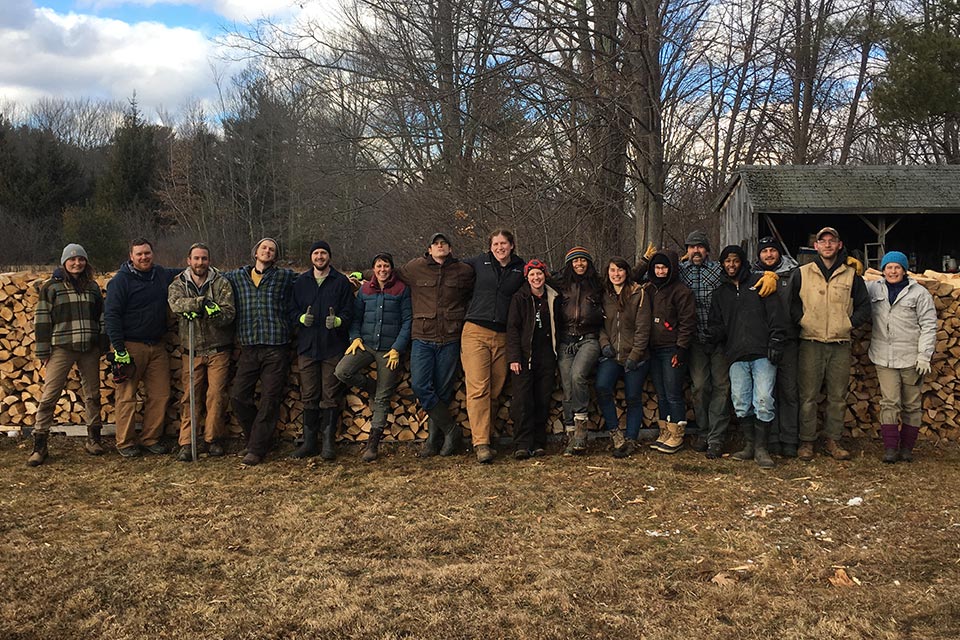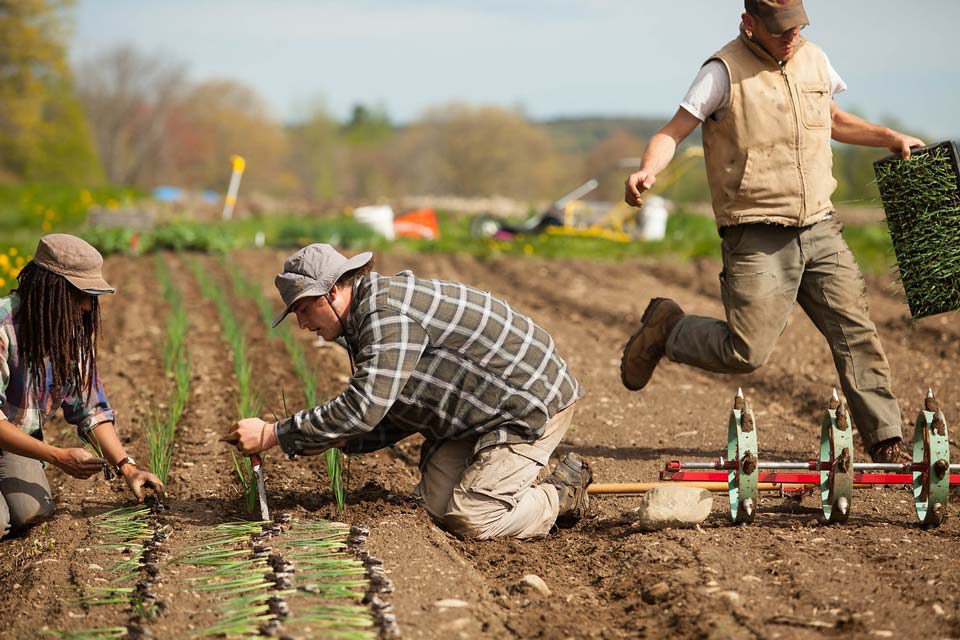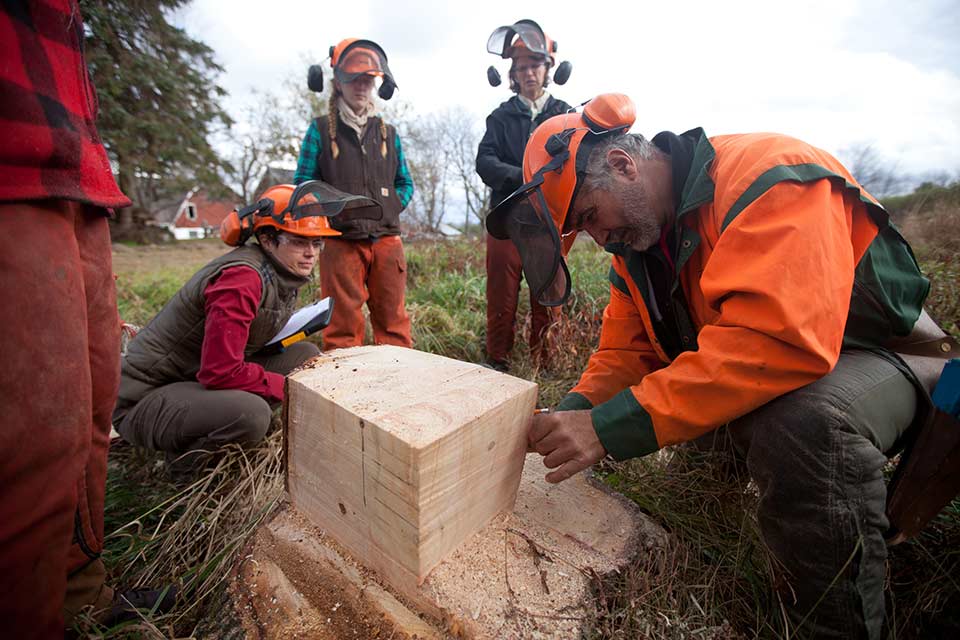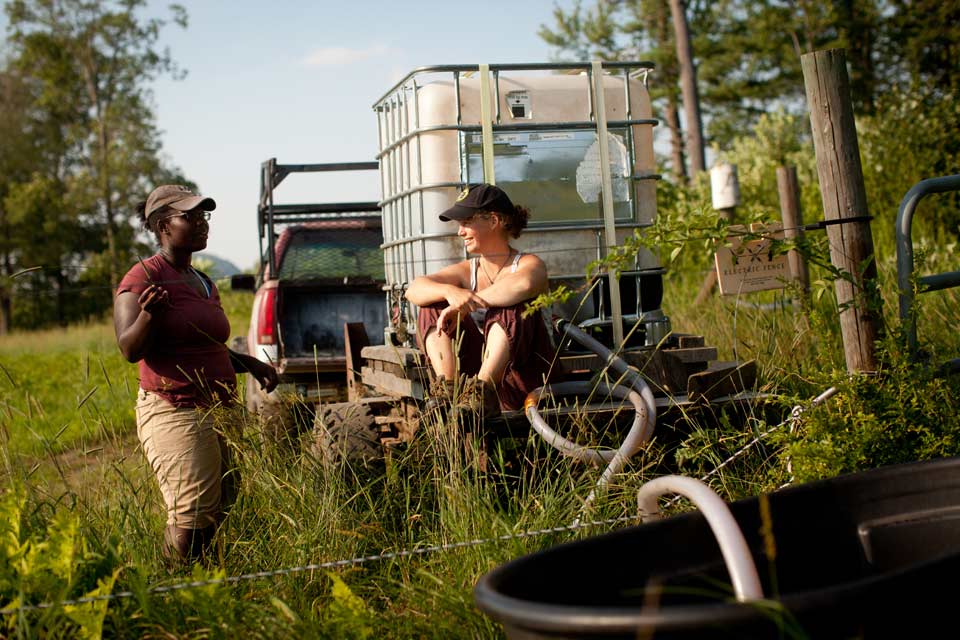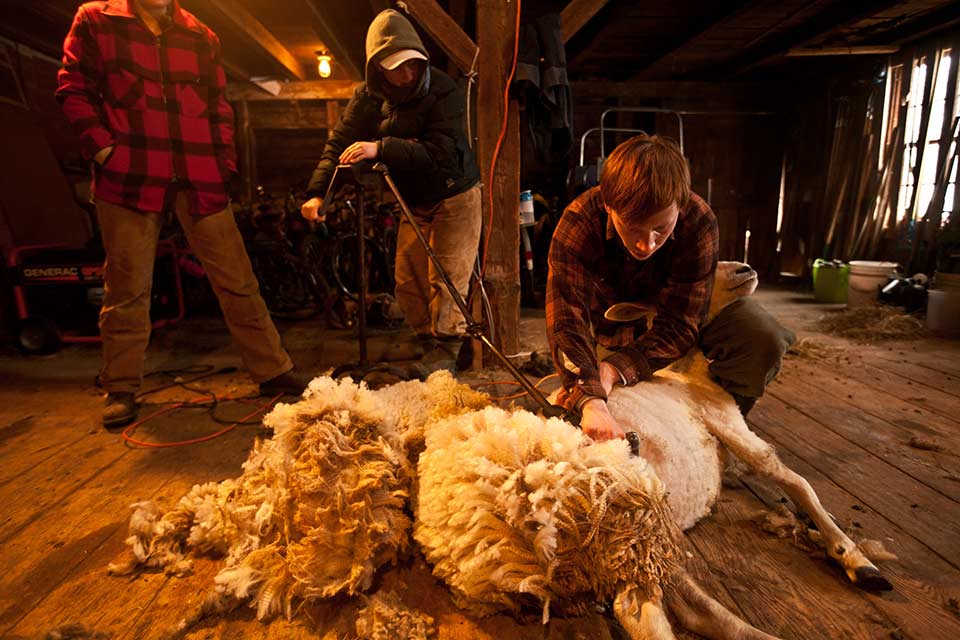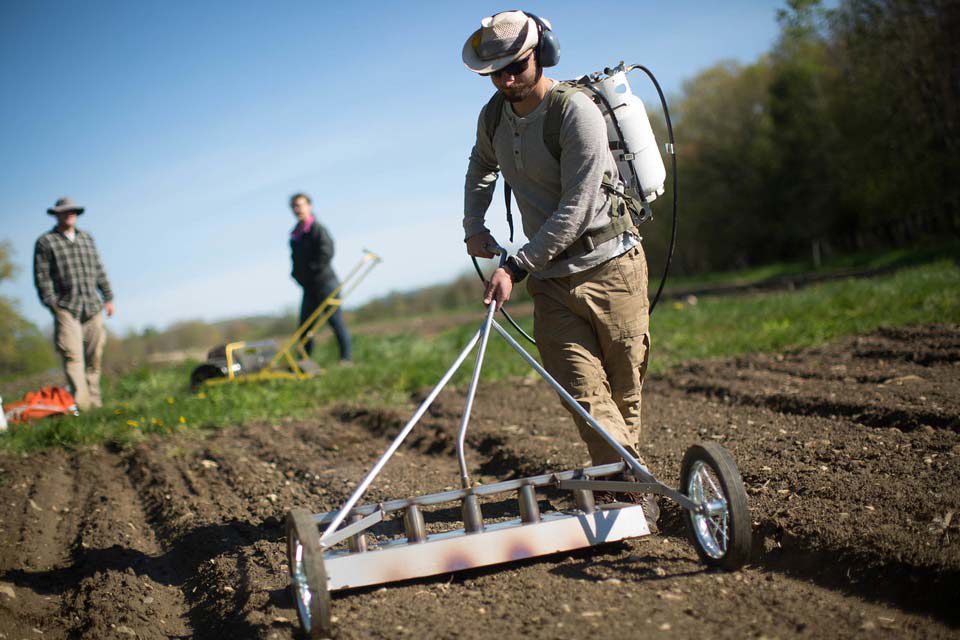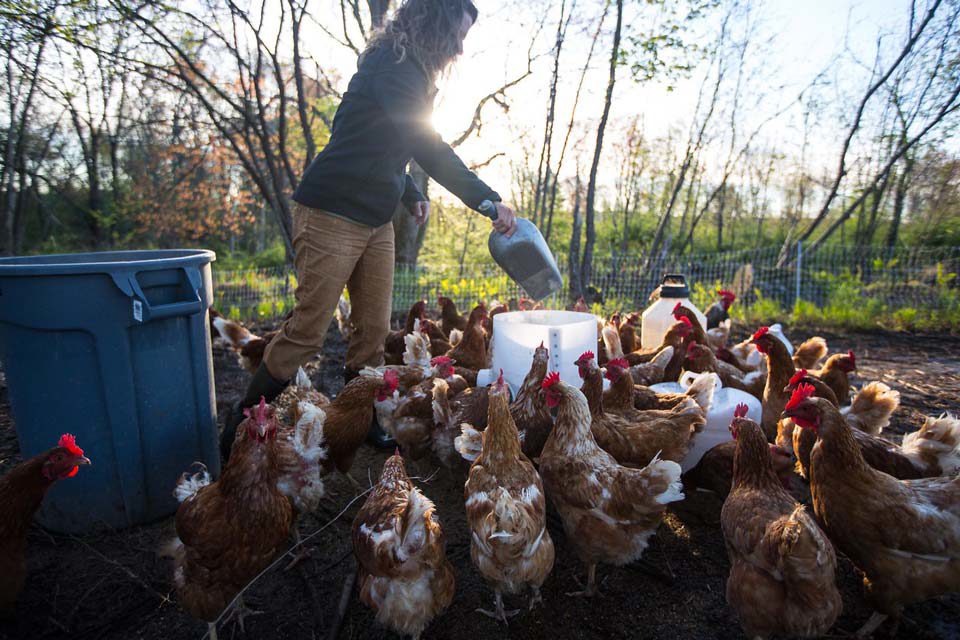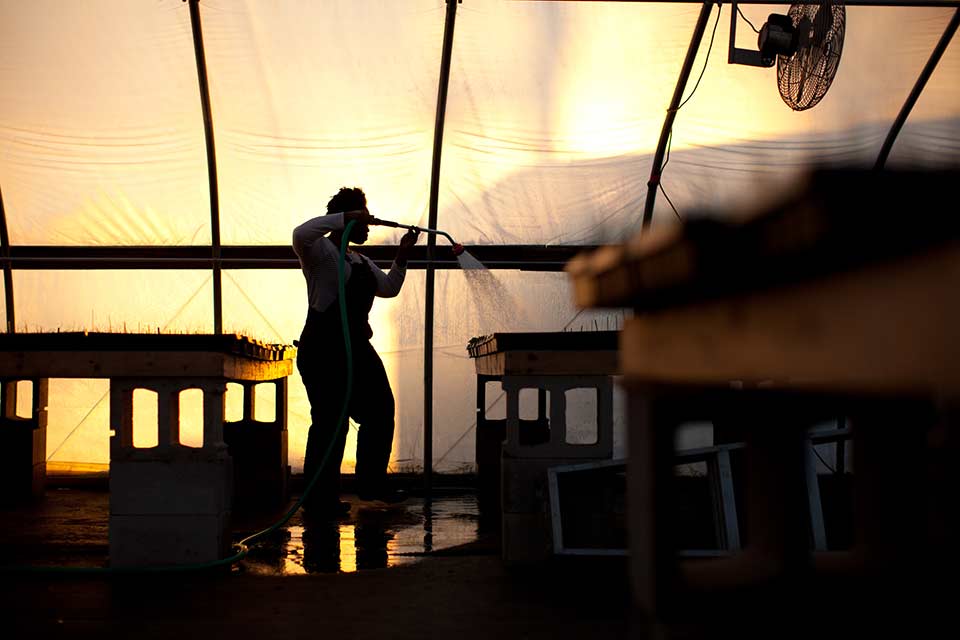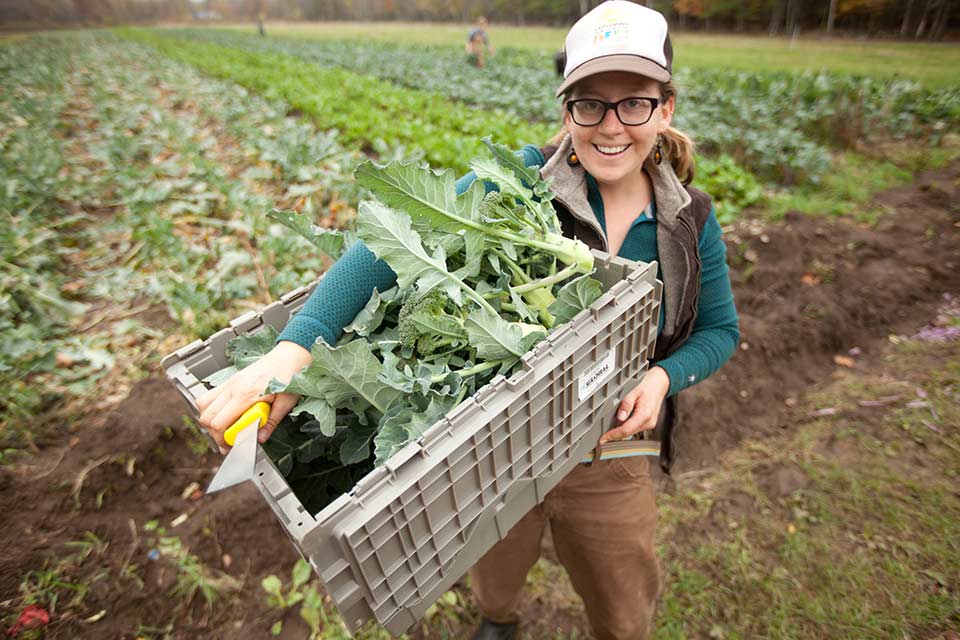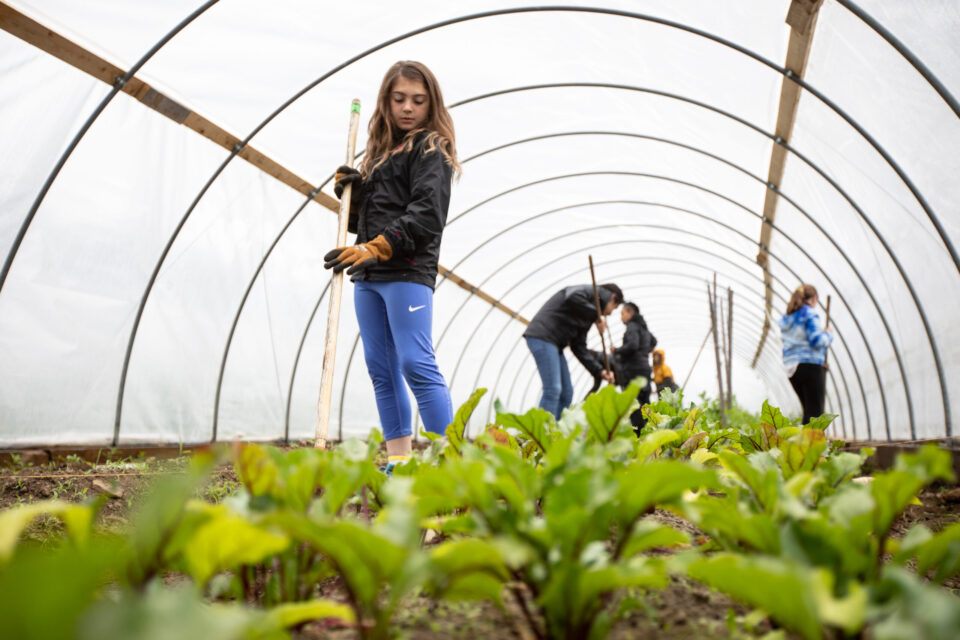-
As of the end of the 2018-19 program year on September 15, the Learn to Farm Program is no longer accepting applications as we take a pause in programming to renew its offering for the future.
The Farm School has successfully delivered skills-based farmer training and life-changing experiences to over 150 program participants over the past 16 years. Over that time span we’ve dialed in an extraordinary curriculum, and the training provided has become consistently excellent. However, we are also always striving to improve. We have determined that it is not possible to carry out the kind of thoughtful analysis, imagining and reset that is desired in the midst of year-round programing, and thus The Farm School is investing in a “fallow” period for the program. Just as is the case with fallow years in the fields, we anticipate that this fallow period for the Learn to Farm program will set the stage for its increased vitality far into the future.
Whatever comes next will certainly hold at least some of the DNA of what has come before. If you would like to be kept informed of our plans as they develop, please fill out the form at the bottom of the page.
The information below and the tabs above give a full description of the program AS IT EXISTED.The Learn to Farm Program seeks to train thoughtful, engaged and responsive farmers and leaders in practices of farm production that sustain and regenerate land and community.
The Farm School is licensed by the Massachusetts Division of Professional Licensure as a private occupational school. A full year’s college credit is available for Sustainable Food and Farming majors at the UMass Stockbridge School of Agriculture. 87% of those who enrolled in the program graduated in 2018.
Program Structure:
Since 2002 The Farm School has offered a practical, real-world agricultural education for aspiring farmers, educators and community leaders. The Learn to Farm program is a full-time, residential immersion in the work and rhythms of sustainable farm life. Each year we accept 12-16 applicants into the program, which runs October – September. Most students live together in our farmhouse and help our instructors manage 12 acres of Mixed Organic Vegetables, 60 Acres of pasture for raising pigs, sheep, beef and dairy cows, and laying hens, 200 Acres of woodlot, and 2 Acres of gardens and orchards. Learn about Life on the Farm.
What We Teach:
We help our students establish conceptual understanding and physical competency in a wide range of skills and areas of farm production: forestry, animal husbandry, carpentry, mechanics, business planning, homesteading, marketing, cooking, organic vegetable production, farm-based education and beyond. The program curriculum reaches one hand back into history to pull forward the best of what traditional agriculture has to offer and with the other pushes ahead into cutting edge creative and dynamic ways of enriching our stewardship of land. Check out our curriculum.
How we Teach:
Everyday and in every way our student farmers learn to farm by farming, supported by formal coursework, in-field mentoring from our staff and instruction by regional experts. We value field work as our primary mode of instruction. Our small discussion-based classes are balanced with long hours in the greenhouses, fields, forests and barns. The training is rounded out with field trips, conferences, reading and assignments, and an independent project. Meet our staff instructors.
Why we believe this training is important:
The Learn to Farm program is an experiment in living into a relationship to place, work and community that is timeless and authentic. Beyond the mechanics, actions and practices of farming, we also hope to instill in our student-farmers an attitude of kindness, respect for simple work and a lifelong ability to innovate, analyze and problem solve. The Learn to Farm Program supports students to develop the perspective, affection, confidence and skills that can shape their future life and enrich the communities and lands they touch. Read more about our Students and Alumni.


-
The courses described below are woven together in the natural, seasonal pattern of ongoing farm work. Student farmers participate in every course listed, and each student’s skill acquisition is monitored with an advisor in ongoing evaluations. In all the courses offered, students can expect introductory class work and discussions which lead to extensive on-farm learning experiences.
Click on the links below to learn more about each of our subject areas.
crops
Field crops course work focuses on skills and concepts relevant to commercial vegetable production and students experience the production environment of our two hundred member Community Supported Agriculture operation. Crops occupy approximately 35% of the total program time.Reading and Interpreting Soil Tests and Managing Soil Fertility This course involves a series of classes, discussions, and work periods throughout the whole year. Students learn how to take soil samples and then to read and interpret the soil report that comes back from the lab. Students learn the many things that go into improving and maintaining healthy soil from compost applications to cover cropping, amending, fertilizing, crop rotation, and effective conservation tillage, Fall, Winter, Spring, Summer.
Crop Planning In this three part course students learn the step-by-step process of creating a crop plan for a CSA or a market farm. We begin by setting harvest goals for various crops, investigate potential yields of those crops, and then look into the space required to grow various crops. We examine varieties of crops, management practices, crop rotations, as well as seed ordering, record keeping and costs of seeds for various crops, Winter.
Greenhouse Propagation This course takes place in discussions and work periods from early spring through late summer. Students are taught all the skills they need to successfully start seedlings on a production scale. These skills include seeding, watering, temperature control, thinning, disease control, hardening off, and fertility management. Students also learn about various supplies that are needed in a greenhouse environment from pots and flats, to soil media, labels and pens. Students grow to be individually responsible for watering and managing our greenhouse production for one week at a time, Spring, Summer
Row Crop Production This course takes place throughout the year during work periods. In this course students learn the skills that it takes to manage a diverse vegetable farm with up to ten acres under active cultivation. These skills include (but are not limited to) tillage and field/bed preparation, seeding, transplanting seedlings, hoeing, hand weeding, field cultivation, harvest management, and presenting high quality vegetables for sale. This course is central to the production needs of the farm and students take on real responsibility to help the farm succeed, Fall, Spring, Summer.
Pest, Weed and Disease Control In this course students learn to identify and manage pests, weeds and disease organically. This is done through a series of classes, field walks, and farm work periods. In various classes students learn the proper practices to limit and inhibit pests, weeds and disease. During weekly field walks with instructors, students learn to identify the various things that can inhibit a plants growth from cucumber beetles, to switch grass, to late blight. In work periods, students take part in actively preventing or managing pests, weeds, or disease through the use of row covers, tractor tools and various organically-certified sprays, Winter, Spring, Summer.
Extending The Harvest In our short New England growing season we try to find ways to increase our harvest window for our CSA and market customers as well as our community here at The Farm School. In this set of discussions and farm work periods we examine various levels of tools that can be used to extend our harvest season. Beginning in the spring with our use of floating row covers, carrying over to the use of row covers to protect crops in the fall. Students are exposed to small-scale season extension techniques through the use of cold frames and larger scale season extension through the use of our 30’x90’ high tunnel which produces food through the winter for The Farm School Community. Students also learn how to grow for and to manage a root cellar, Spring, Fall, Winter.
Small Fruit and Orchards In this course students learn the annual cycle of care for apples, blueberries, strawberries and raspberries. Students learn how to prune, fertilize, and manage these crops through a series of special classes and Farm Work Periods that involve a professional orchard manager and a fruit scientist from UMASS. In these classes students will learn the proper skills and techniques to care for these long lived fruit crops, Fall, Winter, Spring, Summer.







farm animals
Farm Animals coursework builds confidence and competence caring for animals and the land that feeds them. Outside of daily chores, Farm Animals occupies approximately 15% of the total program time.The Family Cow Each student spends at least two weeks doing daily chores with the herd managers of the small dairy down at our neighboring farm for school programs, developing the muscles and knowledge for both the time-honored tradition of hand-milking and the more modern art of machine milking. This course covers clean milking practices, safe raw milk handling, care and nutritional requirements for the lactating cow and the the process of drying off. This course is congruous with the dairy transformation course,Fall.
Animal and Poultry Meat, Egg and Wool Production Over the course of the year, students learn to manage the myriad of factors that effect production in our 100 bird laying flock, herd of Devon mixed-breed beef cattle, flock of Border Leicester sheep as well as seasonal meat birds and pigs. Students will design and build shelters and plan how to meet nutritional needs while engaging in a series of classes covering basic species-specific animal health information regarding gestation, heat cycles, breeding, reproductive complications, birthing, common ailments and their treatments, vaccinations and parasite management. Students also learn how to process the gift that each animal brings to the farm—manure, eggs, meat, wool—in a humane and respectful manner. Compost management and its application in the field is taught and an optional introduction to the slaughterhouse is provided along with instruction on cutting choices. Also, interested student farmers participate in the on-farm processing of poultry, during which staff mentors pass along skills in a carefully guided atmosphere with attention to humane and clean handling and processing, Fall, Winter, Spring, Summer.
Pasture and Hay In a series of classes, students are introduced to the importance of grass in a farm operation. Basic botany, grass and legume identification and overall pasture performance in relation to intensive grazing and haying form the beginning of the class. Students then practice rotational grazing on a daily basis from May through December and are asked to evaluate height and quality of each stand to determine stocking density for each 24 hour period. Additionally, students are taught the theory and benefits of multi-species, successive grazing with our livestock and poultry. Summer brings hay which we load from neighboring fields that results in stronger muscles along with a barn full of square bales and haystacks in the fields for winter feeding, Fall, Spring, Summer.
Fencing Students are introduced to various types of portable electric and semi-permanent fencing systems. In a formal on-farm class students are taught about species-specific set-ups, voltage, appropriate chargers, sourcing, pricing, safe and effective connections, shorts, trouble shooting, gates, and overall maintenance. Students are asked to design an appropriate fencing system given a set of parameters.Students gain a working familiarity with portable fencing through their management of rotational grazing on the farm, Fall, Summer.
Daily Care and Observation This is the core of the Animal Husbandry program, where student farmers are given responsibility for the daily animal and poultry chores. Student farmers are introduced to the nature of our various livestock and poultry species including social behavior, eating habits, flight zone, and vision—all contributing factors in low-stress handling for moving them on pasture, as well as when loading and treating them. Responsibilities include daily observation, feeding and care for our beef herd, sheep flock, seasonal pigs, poultry and draft horses, Fall, Winter, Spring, Summer.
Draft Power This course introduces the fundamentals of safely harnessing, hitching and driving single-horse and two-horse teams. Students learn to drive from the ground and then on a wagon and fore-cart with a focus on clear communication through effective use of the driver’s hands and voice,Fall, Spring, Summer.






forestry
Forestry coursework equips students to independently manage a wood lot for personal and commercial production. Forestry occupies approximately 7% of the total program time.
At Home in the Woods Guided introduction into the history of working woodlands in New England. Workshop series begins at nearby Harvard Forest and continues into the home forests at The Farm School. Students examine and learn how to interpret various living landscapes to identify how agricultural practices have changed over time and begin to form their own perspective on how they’d like to care for the woods going forward. Course work includes native plant and tree identification through the seasons and basic map and compass use, Fall.
Managing Wood Lots for Production In this workshop, students enter the Farm School wood lot to learn how to select trees for harvest. Students are taught how to maintain or increase the productivity of a wood lot while differentiating between cordwood and timber for harvest. Grading for BTU value and lumber is included. Instruction is also provided in laying out a harvest plan, including landings and skid roads. As a final project, each student marks a section of forest for harvest, Fall.
Logging Practices Students complete multi-day Game of Logging Levels 1 – 3 chainsaw safety training courses which include basic chainsaw safety and maintenance, felling, limbing and bucking. Completion of this course is recognized by Game of Logging, an international timber harvesting training program, and provides students with the skills to harvest and process trees safely, Fall
General Forestry Practices Students hone accumulated skills by continuing the management of the Farm School forests. On an annual basis this includes the selection, marking, felling and processing of 10 cords of firewood and at least 10,000 board feet of lumber. During this time, students will get additional instruction and experience in the operation of the splitter and our band-saw mill, as well as tractor and animal power skidding methods, Winter, Spring.




practical skills
Practical Skills coursework gives students the tools to fix what inevitably breaks and build what’s needed for their own farm enterprise. Practical Skills occupies approximately 15% of the total programing time.
Farm Carpentry and Building Students start with a familiarization of various types of lumber both sourced from the farm forest and local lumberyard, move on to project design and material pricing while valuing the possibility of recycling material from around the farm, and then complete many practical on-farm projects such as animal and equipment shelters, feeders and farm repairs. Course includes thorough presentation of the tools students will need for their future farms including a working knowledge of the safe and efficient operation of basic hand and power tools, Fall, Winter, Spring, Summer.
Engine Mechanics, Equipment Maintenance and Repair Here students gain a basic introduction to shop tools, engines, lubrication, cooling systems, batteries, charging and starting systems, ignition, fuel and steering systems and no starts. Vehicle maintenance and common automotive questions, tractor maintenance, schedules and manuals, and some shop work including jump-starting a tractor, pull starting a tractor and changing a tire are also covered. During workdays, students will gain confidence and competence in basic maintenance and repair procedures such as checking engine fluids, changing oil, greasing equipment and replacing parts when necessary, Winter, Spring, Summer.
Tractor and Equipment Use This is a course that begins in the Fall upon arrival at the Farm School and continues through the whole year. Our primary goal is for students to learn to use all of our tractors safely and effectively.This is done first through a basic orientation and the use of obstacle courses and then through safe and controlled practice in the field with our various tractor implements. After students gain a comfort level with the farm’s tractors they take part in a set of Tractor Skills Tutorials periodically through the spring and summer. These tutorials cover the use of our tools for tillage including the BCS Walking Tractor, the Chisel Plow, the Disc Harrow, and the Spring-Toothed Harrow as well as our tools for weed cultivation including the Basket Weeder and the Cub Cultivator. We also orient student farmers to the purpose, function and safe use of the bucket loader, the brush hog and the manure spreader as well as tractor-pulled hay equipment and horse-drawn implements such as the forecart, Fall, Winter, Spring, Summer.
Welding and Cutting A guided introduction over several classes to stick welding and cutting metal with torches in order to be able to fix farm implements and equipment. Workshop culminates in a collective student project, applying the skills taught throughout the series, Fall.
Hand Tool Use and Maintenance In this course students will learn the effective use and maintenance of hand tools. Particular attention will be paid here to the simplest set of tools necessary to grow food, for example a digging fork and a scythe. Skills practiced include choosing the appropriate tool for a specific job as well as how to care for that tool. Tasks will include sharpening and oiling tools, both in the winter and periodically throughout the growing season, Winter, Spring, Summer.
Timber Framing In this week-long workshop, student farmers are carefully guided in using a set of plans in order to chisel out and then erect the frame for a small building. Developing muscle memory and real skill with a simple set of hand tools, students are given the confidence to know that wherever they land, they can put up a sturdy barn, Fall.






homesteading
Homesteading coursework enables students to delve into small scale growing and added value products. Homesteading occupies approximately 15% of the total program time.
Home Gardening Weekly time in our home garden provides the opportunity to gain confidence in growing for a family or community. We work our ½ acre farm house garden entirely with hand tools, nurturing each plant and carefully observing plant health and insect activity. Our goal is to grow food for our ‘family’ for the year. The course includes planning, seeding, sourcing plant starts, weed management and garden composting, Fall, Spring, Summer.
Introduction to Cooking From The Farm Preparing meals for one another with the food from the farm is an integral piece of the program and enables students to gain confidence and experience to draw from when educating customers about what we’re growing. Almost immediately upon arriving on the farm, students begin learning to quarter a fresh roaster, make bread from scratch, wield a knife effectively and prepare wonderful dishes from our fields, Fall.
Food Preservation This course provides ongoing experience with dehydrating, freezing, canning (both pressure and water bath), the ancient craft of lacto-fermentation and cold storage management. Instruction focuses on understanding food safety with a goal to have food from the farm in the pantry for the next class of students! Also, in an effort to utilize as much of our animals as possible, we teach student farmers how to safely process old layer birds into chicken stock, beef bones into beef stock and back fat into lard for cooking, Fall, Summer.
Dairy Transformation and Cheese making In this course we explore milk composition and chemistry and then begin to play with milk—student farmers practice making butter, ice cream and yogurt. Student farmers then move onto the world of cheese, first exploring the various styles of cheese, the distinction in working with sheep, cow and goat’s milk and sourcing basic equipment. We then work through fresh cheesemaking and graduate onto mould ripened and aged cheeses. Instruction includes formal classroom discussion with a focus on cheese as a value added product for a farm business and includes lots of hands-on practice, Fall.
Beekeeping In this several-part course, students will have periodic classes and farm work periods throughout the year. Students will learn about the biology of bees, hive behavior, tools, and strategies for managing bees in a small apiary. Students will take on the feeding, any work to be done, and the honey harvest at the end of the summer, Fall, Winter, Spring, Summer.
Fiber Arts This course follows the fleece from sheep to shawl. Each student farmer is guided through the delicate and laborious process of shearing our sheep. Students then skirt, wash, dye and card their wool and learn to felt, spin and knit, Winter.





marketing
Marketing coursework prepares students for commercial success farming. Marketing occupies approximately 3% of the total program time.
Agricultural Business Planning This 6-part series examines The Farm School’s farm business enterprises to learn both the value and process of creating a formal business plan. Students learn to make enterprise budgets, create a farm image or brand, finance an agricultural business and make cash flow projections. Special agricultural considerations are presented and student farmers complete the course with a comprehensive business plan for a farm enterprise of their own, Spring.
Direct Marketing This course teaches student farmers how to understand and identify their target markets. Topics include the CSA and farmers market models as well as direct sales to restaurant accounts. Teaching techniques range from classroom discussion and review of popular culture media to marketing directly with our customers at the our stand at the Belmont Farmers’ Market and CSA Stand at Iggy’s Breads of the World. Skills include branding, product display, outreach and relationship building with farm customers, Spring.
Legalities and Regulations In this series we cover various regulations around poultry processing, USDA inspected slaughterhouses, on-farm egg sales, CSA sales, Farmer’s Market regulations, labeling considerations, raw milk/product sales, value-added products & certified kitchens as well as insurance and other legal and regulatory considerations, Spring.
Acquiring Farmland This course presents the various options for new farmers to acquire the farmland they need to begin their agricultural business. The class covers planning, assessing land needs, searching for properties and evaluating agricultural land. The course covers a full range of acquisition options, brokering agreements, easements and other restrictions, and land use agreements, Spring.



evaluation
Each student farmer is assigned a staff advisor, with whom she/he meets monthly to review the program and discuss progress. Using a check list, they work together to assess where the student farmer falls in his/her comfort, skill and confidence with specific practices. This process is important for the student to know where she or he can concentrate next, and for the staff to make sure they’re covering the material they need to cover with all the student farmers.beyond the farm
Beyond the Farm coursework expands the farm horizon past our ridge top to other regional farms, conferences, and broader topic areas. Beyond the Farm occupies approximately 10% of the total program time.
Independent Project During the months of April and May, a once-weekly period is provided for student farmers to independently explore an aspect of farming that they feel might fit into their future. Student farmers develop a learning plan that outlines their specific objectives and we identify appropriate mentors, either on staff or in the larger community, to facilitate the achievement of each student’s goals, Spring, Summer.
Farm Visits An important piece of our curriculum is the over 20 area farms and farm-based businesses that we visit throughout the year. Students gain a broader sense of what’s possible by visiting many successful farmers who established farm businesses that are different from the farm business at The Farm School. For example, student farmers visit established farmstands, raw milk dairies, grain CSA, cheesemakers, biodynamic farms, entirely horse-powered farms, community farm operations and farm restaurants. Additionally, we visit other meat & vegetables CSA’s for students to get a sense of various farm practices, distribution methods, styles and scenes, Fall, Winter, Spring, Summer.
Winter Intersession One winter month – from December through mid-January – is designated as a time of off-farm exploration for the student-farmers. Individuals are encouraged to take this time to expand their farming and life experience in any way they choose. Expenses for this period are not included in tuition, Winter.
Next Steps Various resources for near-graduating student farmers are presented as they begin preparing to leave The Farm School and head out into the world to farm on their own, work for an educational farm, manage or work at a production farm, continue their training in the fields or classroom, organize farmer’s markets or work in the field of food justice or advocacy.



The Farm School is located in rural, north-central Massachusetts straddling the towns of Orange and Athol, MA. The Learn to Farm Program is based in the farm yard and farm house at Maggie’s Farm, in the north of our land base, but the fields and pastures student farmers manage extend the full mile all the way down to the home of the children’s programs at Sentinel Elm farm in the south. Map Projection UTM Zone 18 N, NAD 83. Contour Interval 10 feet. Digital Elevation Model from MassGIS. Using: ArcGIS Version 10.2 and Adobe Creative Suite 5
Map Projection UTM Zone 18 N, NAD 83. Contour Interval 10 feet. Digital Elevation Model from MassGIS. Using: ArcGIS Version 10.2 and Adobe Creative Suite 5


What’s it like to be a student in the Learn to Farm Program?
Here are answers to some of our most frequently asked questions from perspective students.
What is the class size?
We typically receive around 50 applications a year for the 15 openings.What is the age range of students in the program?
Students must be at least 18 years old to participate and there is no limit to the age of our students — typical classes include students 18 – 50s/60s.What is on-farm housing like?
Students who live on-site are assigned their own private bedroom in the dorm of our farmhouse. Everything else is shared: bathrooms, kitchen, common spaces, etc. Bedrooms include a loft bed with mattress, space for a desk, and limited built in shelving — the rooms are pretty small, something akin to a college dorm single. We have room for 10 students on site. Some students choose to live off-site or are accepted into the program after the farmhouse spaces are full, and they secure their own housing off the farm (we have lots of housing connections in the area). Students who live off-site receive a $4,000 tuition reduction.How do meals and food work?
Students (and staff) take turns preparing breakfast and lunch for the group as part of meal cooking rotation. We eat meat and veggies we produce on the farm and buy in bulk staples to supplement our pantries. Each year the class of student farmers puts away food in the root cellar, freezers and pantries to provide for the winter eating of the next class. Students are mostly on their own for making dinner but are welcome to food from the pantry, which The Farm School stocks, and from the vegetable fields. Essentially, all food is provided for students as part of the tuition. Students have a shared personal fridge and a personal food box to store any of their own specialty items. Every two weeks we share a “community dinner” as a chance to come together and meet about topics relating to communal living, learning and working.How do holidays and weekends work?
The program is very full time Monday – Friday, with a shared weekend chore schedule (individuals are on chores once every 6 weeks or so). Students receive a few days off around Thanksgiving, we take a month long break in Dec/Jan and every student gets one week of vacation time to schedule individually. Students are welcome to go home during weekends and break times, they are also welcome to stay on-site if they chose.Do I need a car?
Many students find it helpful to have their own transportation as the Farm is located in a rural area without a lot of public transportation access. However, every year several student farmers don’t have cars and are able to catch rides or borrow cars from fellow students to get most of their transportation needs met. Students drive personal vehicles to field trip destinations throughout the year and carpooling is greatly encouraged. We encourage students to offer to help with gas money if they are catching rides from others.







Learn to Farm Staff
This is a place to learn like no other. A talented group of farmers is assembled whose first purpose is to serve the learning and living experience of the student farmers. Together, working towards the common goal of a commercially successful farm operation, the student farmers and the farmers themselves meet in the fields, workshops, forests and classroom to craft an extraordinary year of learning. Our farmers bring deep experience and real joy to their work growing food and growing farmers. In addition to the team on the farm, selected specialists lead regular seminars and workshops in their area of expertise.
And YOU! The most important actor in this extraordinary learning setting will be you. As a student farmer, your role in your education cannot be over-emphasized. We will place an amazing array of tools in your hands. You will need to grasp these tools firmly and apply yourself completely, because the most essential learning—your real advancement in confidence and competence as a farmer—will only take place when you work with these tools, hard and long, for days on end, asking questions when you need answers, refining your grip over time, and releasing yourself into the task at hand, no matter how simple or complex it may be.
Patrick Connors, School Director
 Having participated in the early years of the program as a student farmer, Patrick returned to lead The Farm School after farming in California. Along with his role binding the entire ridge top community together, Patrick brings an excitement for small-scale farming and woodlot management to the student farmers.
Having participated in the early years of the program as a student farmer, Patrick returned to lead The Farm School after farming in California. Along with his role binding the entire ridge top community together, Patrick brings an excitement for small-scale farming and woodlot management to the student farmers.Carlen Rigrod, Farmer/Teacher
 Carlen has worked at The Farm School for 20 years, first as the Grower at the Program for Visiting Schools and then as the Co-Founder of the Practical Farm Training Program. Gifted and deeply experienced with plants and soils, she leads ongoing workshops and work periods on plant life, the home garden, compost, biodynamics, orchard and small fruit care, and soil mapping.
Carlen has worked at The Farm School for 20 years, first as the Grower at the Program for Visiting Schools and then as the Co-Founder of the Practical Farm Training Program. Gifted and deeply experienced with plants and soils, she leads ongoing workshops and work periods on plant life, the home garden, compost, biodynamics, orchard and small fruit care, and soil mapping.Kristen Wilson, Crop Manager/Co-Program director
 Before coming to The Farm School, Kristen co-managed a 350-member CSA and farm business for seven seasons. Here at the farm, she loves to be a part of a kind, openhearted community, where she can teach and learn all at the same time. She is so excited to be passing on the important knowledge of growing, harvesting, cooking, and eating your own food.
Before coming to The Farm School, Kristen co-managed a 350-member CSA and farm business for seven seasons. Here at the farm, she loves to be a part of a kind, openhearted community, where she can teach and learn all at the same time. She is so excited to be passing on the important knowledge of growing, harvesting, cooking, and eating your own food.Josh Pincus, Livestock Manager
 Josh teaches animal husbandry and coordinates the management of all the livestock on the farm with the adult student farmers and visiting children at the Program for Visiting Schools.
Josh teaches animal husbandry and coordinates the management of all the livestock on the farm with the adult student farmers and visiting children at the Program for Visiting Schools.Bradley Teeter, Forestry, Draft Animals, Grounds
 Bradley came from Alabama in 2002 to be a summer camp counselor at the Farm School and ended up in the first Learn to Farm class. He has never really left. He loves that we are a tight family and community, always eating our meals together and taking care of this ridgetop. Brad works with the draft horses logging, he’s the music teacher at the Chicken Coop, and he helps in the fields in the summers.
Bradley came from Alabama in 2002 to be a summer camp counselor at the Farm School and ended up in the first Learn to Farm class. He has never really left. He loves that we are a tight family and community, always eating our meals together and taking care of this ridgetop. Brad works with the draft horses logging, he’s the music teacher at the Chicken Coop, and he helps in the fields in the summers.blogs
Follow weekly updates from the farm by Livestock Manager
and farmer/teacher Josh Pincus on his blog The Farm School Manual.
In the Field Notes blog, current Student Farmers reflect on their experiences in the
Learn to Farm Program and share some of what they learn!The DotPages by past Learn to Farm student farmer and farmer/teacher at the Program for Visiting Schools,
Dottie Arnold (Learn to Farm ’14)
Dirt Eaters by past student farmer Brian Massey (Learn to Farm ’14)

One full year from a Learn to Farm student’s perspective – Plough and Stars project by Erik Jacobs (2012-13).
videos
One Year at Maggie’s Farm from Paola Pagano on Vimeo.
At The Farm School, Making The Leap From The Boardroom To The Cornfield.A piece by WGBH news featuring our student farmers and alumna Laura Sackton, founder of First Root Farm in Concord.
PBS’ crew of Growing a Greener World enrolls for a week at The Farm School’s Learn to Farm program, December 1, 2011.
Press
The Learn to Farm Program has be featured in many media stories. Take a look below to see the range of what we do in the program through the eyes of writers, students and photographers.
2013 Learn to Farm Graduate Erik Jacob’s regular articles about the Learn to Farm program in the Boston Globe:
- January 1, 2013 – Letter from Farm School
- February 5, 2013 – Spring seems far away
- March 26, 2013 – Farm School apprentices prepare for spring
- May 13, 2013 – Dug in and flat out: planting time
- December 3, 2013 – Apprentice’s year comes to an end
Erik’s pictures featured on NPR’s the picture show,In Search of Sunrise: A Photographer Heads to Farm School, November 22, 2012.
The US professionals quitting the rat race to become farmers, BBC, August 28, 2013
At The Farm School, Making The Leap From The Boardroom To The Cornfield.A piece by WGBH news featuring our student farmers and alumna Laura Sackton, founder of First Root Farm in Concord.
PBS’ crew of Growing a Greener World enrolls for a week at The Farm School’s Learn to Farm program, December 1, 2011.
The Learn to Farm program in the Boston Globe,Tough road to reap, August 24, 2011.
Article about the Learn To Farm program in the Pacific Standard, March 10, 2011.
The Learn to Farm program in the Boston Globe,Magna cum carrot, November 3, 2010.
Check out The Farm School’s adult program in Farming Magazine, May 2010.
Farm School Director and Learn to Farm Graduate, Patrick Connors, in UNH Magazine, Fall 2008.
A Year in the Learn to Farm program, Edible Boston, 2008
A 4-part Series
Download as pdfs:grads
Field Study—Grads in the Field
While some of our graduates use their Learn to Farm year to ground rich lives not represented by individual web sites – PhD studies in plant genetics and English literature, for example, or tackling vet school and then the life of a vet, or straight up homesteading – many of our graduates have launched professional lives that can be explored via specific web sites, such as these: Max Morningstar was the Farm Manager at Siena Farms in Sudbury, MA for eight years and founded MX Morningstar Farm in Copake, NY in 2013. Kelly Verel works with the Project for Public Spaces in their Public Markets Program. Eleanor Kane and Theodore Weigand operate Brasen Hill Farm in Barrington, NH. Kate Lanou is an apprentice in the dairy at Appleton Farms in Ipswich, MA. Andrew Harrington graduated in 2013 and is now the vegetable production manager at Fishkill Farms in the Hudson Valley. Sibongile Sithe is a Fresh Buyer at FoodKick in New York City. Todd Coleman is a farmer at Copper Moose Farm in Park City, Utah. Nick Martinelli, a 2014 graduate, started a webservice, Marty’s Local .
10 Farm School students who have gone on to interesting pursuits
 Adrienne Shelton, Madison, WI
Adrienne Shelton, Madison, WIBEFORE COMING TO THE FARM SCHOOL I had worked on a few farms for three or four months at a time. I was looking to work on a farm for a full year, and interested in learning more about animal husbandry (I had mainly worked with vegetables, fruits, and herbs). Immediately before coming to Maggie’s Farm I was working in the seafood department at Whole Foods until the right farm opportunity came along.
AFTER THE FARM SCHOOL, I was the farm manager at Red Gate Educational Farm in Buckland, MA. I worked and lived at the farm for four years, and did everything from teaching programs to taking care of the animals to running the garden. One of my favorite projects was organizing the Red Gate Farm Seed Bank, where we began growing and distributing locally adapted vegetable and flower seeds. I am now a graduate student at the University of Wisconsin-Madison working in plant breeding and plant genetics. I am working on developing a new variety of sweet corn for organic growers in the area. My interest in organic seeds began during my time at The Farm School, when I attended a seed conference in Vermont and began my first attempts at seed saving on the field behind the farmhouse.
 Dan Greene, Conway, MA
Dan Greene, Conway, MAWHEN I FIRST ENTERED COLLEGE (at the University of Massachusetts, Amherst), I began to flirt with a major called “Social Thought and Political Economy.” Although I took some eye-opening classes in that track, there was a certain practicality missing. I wanted to change the world, but I felt I was only focusing on its problems and getting upset about them. I wanted to do something. At the end of my freshmen year, I felt that I had nowhere to turn. One day after a discussion with a good friend, an answer came to me, seemingly out of the blue. All of my interests – politics, economics, ecology, practical skills, hard work, sustainability, history, culture, nature, and food – intersected in agriculture. I went with my epiphany and changed my major to Plant, Soil, and Insect Science, choosing the Sustainable Agriculture track. It was definitely the most abrupt and drastic decision I have ever made. I visited several local farms in one of my early Sustainable Agriculture courses. One place we went was The Farm School. I was struck by the program at Maggie’s Farm, and all the skills it encompassed. I knew that if I was going to study agriculture academically and get anything out of it, I ought to actually work on a farm (I wasn’t even sure I liked farming). I entered the program in fall of 2006. I was still enrolled as a full-time UMass student and received a year’s worth of credit for my education at The Farm School.
AFTER MY TIME AT THE FARM, I got a job at Open View Farm, a nonprofit organization. I started a small market-garden for the 2009 growing season. I successfully cultivated three-quarter acres of diversified vegetables and marketed them at two local farmers markets. My Farm School education made it possible to build cold frames, devise a crop plan, cultivate and till land, operate a tractor, plant cover crops, successfully market vegetables and perform many other tasks which are essential to operating a small farm. I now have the skills and confidence to pursue my own farming enterprise.
 Grace Cherubino, Bar Harbor, ME
Grace Cherubino, Bar Harbor, MEI WAS A CAMPER AT THE FARM SCHOOL for many summers (after spending time at the Farm for overnight school trips). I loved it, and previously had no farming exposure (aside from farmers markets and farm stands). The decision to apply to the program, therefore, seemed more like fate than plan. I was finishing up high school work (I was home-schooled, so this required a lot of final papers and completing college courses and wrapping it all up with a nice little bow). I felt like I wasn’t ready to jump into college. In recalling my history with The Farm School, I felt the program at Maggie’s Farm would be a good option. I learned more in that year than I can express, not only about draft horses and cheese making and timber framing and crop rotation, but about myself and how to communicate and live with 8 other people in a rich and sometimes trying situation.
NOW, THREE-AND-A-HALF YEARS LATER, I am completing my undergrad degree in “Human Ecology” at the College of the Atlantic (I had originally attended Sterling College right after The Farm School for “Sustainable Agriculture,” but it felt like it was a review). I realized that in college I didn’t need things to be so experiential and ‘real’. All I needed was fascinating lectures and amazing books and professors. I can find open fields and expedition hikes for the rest of my life. I work on the farm at my college, and I live with housemates happily and functionally. I have many plans for after college (including working at The Farm School) – as well as owning my own small farm with organic vegetables and a CSA, sheep and fiber arts. Who knows where the world will take me? All I can be sure of is that I love the way it brought me there. Here.
 Jamie Barrett, Ipswich, MA
Jamie Barrett, Ipswich, MAI FOUND THE FARM SCHOOL FARM when I was 26 or 27. I had been out of college for 5 years and hadn’t quite figured out what to do with myself. I was an English major in school and then worked in education after graduation but I had always wanted to do something more concrete, use my hands, work outside, build something; I had never done anything like that before. I felt I lacked a basic understanding of how we live. I had also just met my wife and we were planning on starting a family. I wanted a work life that would compliment that. There were so many lessons that I needed to learn and I realized then that farming might be a good place to start. The Farm School was a perfect way for me to do this, because I had absolutely no connection to the farming community. Through a season at the farm I came to love the hard work that farming demands. I haven’t looked back since.
I’M STARTING UP MY FIFTH SEASON as the manager of Appleton Farms CSA, working for the non-profit organization The Trustees of Reservations. I apprenticed at this farm for 3 years before taking over. We grow over 200,000 lbs of food for 550 shareholders. We grow over 40 types of vegetables on 24 acres of land and we do it all under the organic growing standards. Within the next 5 years, I hope to have started my own farm enterprise. I remember the moment 8 years ago when I decided I wanted to try farming out; I remember being frustrated because I had such a strong desire but I no idea how to start. The Farm School opened the world of farming up to me in just the right way. The experiential learning in a supportive and real-production environment gave a complete picture of farming. Farming is hard work, and if you don’t like that type of work you won’t like farming, The Farm School was honest about this, and it’s the most important thing that I learned there. It is directly because of my experience at Maggie’s Farm, with the wonderful people there, that I am very happily farming today.
 Kelly Williams, Brooklyn, NY
Kelly Williams, Brooklyn, NYBEFORE I DISCOVERED THE FARM SCHOOL, I had spent about nine months looking for a job, but not really knowing what I wanted to do. I started to read books like “Fast Food Nation” and articles in the New York Times by Michael Pollan and realized that I could merge my two passions (social justice and food) by working in the local food/sustainable agriculture field. I had a MS in Communications and a fair amount of work experience and thought that my knowledge could benefit the field, but at the same time I also realized that I didn’t really know much when it came to farming and direct marketing. I come from a long line of farmers and must still have had some of the farming bug in my blood and thought that the best thing I could do would be to farm for a bit and take that experience with me into the field of local food.
AFTER WORKING WITH GREENMARKET (NYC’s farmers market network) for three market seasons, I began working for Project for Public Spaces (PPS) in their public markets department. I’m still working with them as a Senior Associate where I work with numerous farmers and indoor markets across the country. In my first role at PPS, I supported and provided technical assistance to over 20 farmers markets across the country through our grant program. After that project finished, I started working on consulting projects including a feasibility study for a public market district in Boston, MA, a new market district in Louisville, KY, and a study of the Kaiser Permanente farmers market network. I am currently writing a handbook for market managers interested in accepting SNAP (food stamps) at their farmers market.
 Laura Jackson, Morrisville, PA
Laura Jackson, Morrisville, PAIN 2004 FOLLOWING MY MOTHER’S DEATH and the completion of 20 years of work as an independent documentary producer in the Philadelphia area, I felt the need and longing to step away from the life I had been living and return – if only for one year – to a life in the country and, more specifically, to life on a working farm. I wanted to simplify and gain some perspective. I longed to enjoy daily physical exercise, the intimacy with the earth and with animals, the opportunity to share in the day to day experiences of farm life with a small group of other adults. I wanted to be up close again to the lovely wet nose of a cow, put up hay, and begin and end each day where I could see only open fields, mountains and sky. I wanted to be a student. At that time, I was 57 years old.
THREE MONTHS AFTER LEAVING THE FARM SCHOOL, I was hired by Snipes Farm in Morrisville, PA. Our goals were to create a non-profit farm and education entity, begin a CSA program, start the transition to an organic method of growing, explore partnerships with local schools, and design an outdoor “classroom” on their 120 acres. The Snipes Family has lived and farmed on their land for 8 generations: theirs is one of only two farms remaining in Falls Township. I was able to transfer many of the practical skills I learned at Maggies Farm to Snipes: I had the confidence (over-confidence?) to order and install simple electric fencing, and map out the first two acre growing field. I worked with staff to plan the field preparation, create the greenhouse and direct seeding schedule, and set up a primitive washing station. The Snipes family already possessed years of growing and horticulture skills and farm management. I think I brought the larger picture of what was possible to Snipes, and the ability to hold onto the vision while the specific pieces were put in place. I think this was directly tied to the breadth of my learning at The Farm School – the many different skills I was introduced to, the ways they were taught and modeled, and how clear it became to me that we all needed to work together to be successful and to create a healthy community.
 Matt Linehan, Unity, ME
Matt Linehan, Unity, MEI DIDN’T REALLY WANT TO FARM before coming to The Farm School. I wanted to homestead. I wanted to buy cheap wooded land, cut it, build a home, and grow Three Sisters amongst stumps. The thing that appealed to me about Maggie’s Farm (because I could have learned to farm anywhere and earned a wage in the process) was that it seemed to offer the array of skills I thought I’d need: growing, forestry, equipment repair, livestock rearing, haying, & timberframin’. Anyhow, I signed up. I didn’t expect what actually ended up happening. I started at The Farm School in March and by the time we were putting up garlic (mid-July) I had fallen in love with commercial vegetable farming. I loved the quick pace, I loved feeding people, and I loved how even though plenty of jobs on the farm suck (harvesting in a cold rain, getting a tractor stuck as hell) there was always something different to do the next day. There were many hats to wear – laborer, mechanic, grower, carpenter, operator, salesman – and the hats were always changing. And that proved to be the great strength of the program. As an employee of a commercial vegetable farm, you’re subject to the rules of efficiency: you’re a laborer, or a grower; you’re a marketer, a mechanic, or a manager. But as a Farm Owner you must be all of those things and The Farm School let me experience that.
AFTER THE FARM SCHOOL YEAR, my friend and I took a job co-managing 5 acres of certified organic vegetables at a farm in Eastern Massachusetts. We survived that pretty well, but the farm changed owners at the end of the season. So I moved to Maine, set up a greenhouse on a friend’s land, and started tenant farmin’. I started with 1 greenhouse, a Farmall Cub, a name – Sparrow Arc Farm – and me. In 2006 I cultivated 1 1/2 acres, in 2007 6 acres, in 2008 12 acres, and in 2009 20 acres. And in 2008 I finally purchased my own piece of ground in Unity. These days we’ve got 20 acres for vegetables, and 8 for fruit.We sell our produce to restaurants in Boston and Portland, at a farmers market in southern Maine, in a drop-off CSA in Massachusetts, 3 Whole Foods stores, and have several wholesale accounts. I love what I do, and it all started ‘cause of an epiphany at The Farm School: I like growin’ food.
 Pat Farmer, Boston, MA
Pat Farmer, Boston, MABEFORE COMING TO THE FARM SCHOOL, I was living in Washington, DC and working for a national college honor society. It was an exciting job, because I got to travel to colleges and universities around the country and meet with faculty members who work with some of the most promising undergraduate students. Staying in fancy hotels and eating at restaurants all the time was fun, but after a while I began to desire a simpler lifestyle. I wanted to be in one place and really live there, to sustain myself on the land itself. I wanted to work with my hands, and be good for something other than coordinating meetings and sharing best practices. I wanted to live in a community of people from all walks of life and discover my heritage as a New Englander. The Farm School seemed like the perfect place on all accounts! After visiting, I knew it would be a place to learn the skills I desired and explore the lifestyle I imagined. It would not have been possible for me to come to Maggie’s Farm without financial assistance, so I am especially grateful to the friends of the Farm School for supporting my opportunity.
SINCE LEAVING THE FARM, I’ve entered divinity school in Boston. I found working on the farm to be a profoundly spiritual experience, and now I’m eager to find ways to provide similar opportunities for others. It’s challenging to find contentment spending my days indoors again, but it’s exciting to bring my experience on the farm into dialogue with other students in the classroom. Very few of my classmates have lived in rural America or worked on a farm, so my experience brings a new perspective to our discussion. Working at The Farm School also changed how I think about food and eating. Now when I prepare a meal at home, I use seasonal ingredients prepared simply and nutritionally. Cooking has become a welcome break from studying and a chance to put my beliefs into practice. I’m looking forward to finishing my divinity program and getting back to the farm, where I can bring both parts of my life together
 Stella Rabinowitz, North Orange, MA
Stella Rabinowitz, North Orange, MABEFORE I CAME TO THE FARM SCHOOL, I was teaching Special Education at the Elementary Level. I had been doing this for 3 years, but was not satisfied with the work. When I began to think about leaving teaching, I started to fondly remember my experience working as a garden intern on a farm in Lake Placid, NY. Recalling this made me realize it was time to explore farming again and in more depth. I found The Farm School while searching online, and the program seemed to be exactly what I wanted. After visiting, my mother phoned to inquire about how it went. My response was, “It was amazing, I am done teaching, and will soon be entering into the next phase of my life.” It was the 2-hour tour that I took along the ridgetop visiting animals and fields, smiling students who had so many positive things to say about their experience – then my afternoon spent watching the students and a vet perform surgery on a ram – that solidified my feeling that this place was right for me.
AFTER MY STUDENT YEAR AT THE FARM SCHOOL ENDED, I stepped into the position of Farmhouse Coordinator and Assistant Grower (still at Maggie’s Farm). I lived in the farmhouse to support the students and take care of community issues and I also worked in the fields as the Assistant Grower. This position fits extremely well into my plans – as I am beginning to think and dream about my own farm for the future!
 Stephen Corrigan, Troy, NY
Stephen Corrigan, Troy, NYBEFORE COMING TO THE FARM SCHOOL, I was in an entirely different field of work. I graduated college with a degree in economics and spent several years working for a financial research company. While I enjoyed the work, I wanted to do something that contributed to the world in a more positive way. Initially, I began volunteering around the city and fell in love working with a community gardening group that supplied fresh produce to a food pantry for HIV positive individuals. I began looking for ways that I could continue growing food as a profession. Many apprenticeships seemed too focused on hands-on work while many schools seemed too focused on classroom time. What ultimately made me decide on The Farm School was the good mix of classroom instruction and hands-on learning.
I AM CURRENTLY running an after-school program in upstate New York that is growing food commercially with “at-risk” students from the local high school. We are working to convert formerly vacant urban land into a productive farm that sells produce both to urban dwellers – including the students, who each receive a veggie share as part of their pay – and to local chefs, including the governor’s personal chef, who has featured our produce at several state dinners. I cannot even begin to count the ways that The Farm School has influenced how I live my life today; there is absolutely no way that I would be able to do this work without the education I received. I use the formal education in areas such as crop planning and marketing almost daily. I use the hands-on skills just as frequently, both in the fields, while I am directing a harvest or teaching how to cultivate, and in the shop, when I’m building a shed or cold frame. I also know which resources to explore if I need more information on a subject, and how to speak intelligently to other farmers in the area if I need to garner some of their expertise. My year at Maggie’s Farm gave me a solid and broad base of knowledge from which I draw constantly and from which I continue to grow as a farmer.


Learn To Farm
at the Farm School
Our training program for adults — spend a year with us, launch a lifetime of farming

